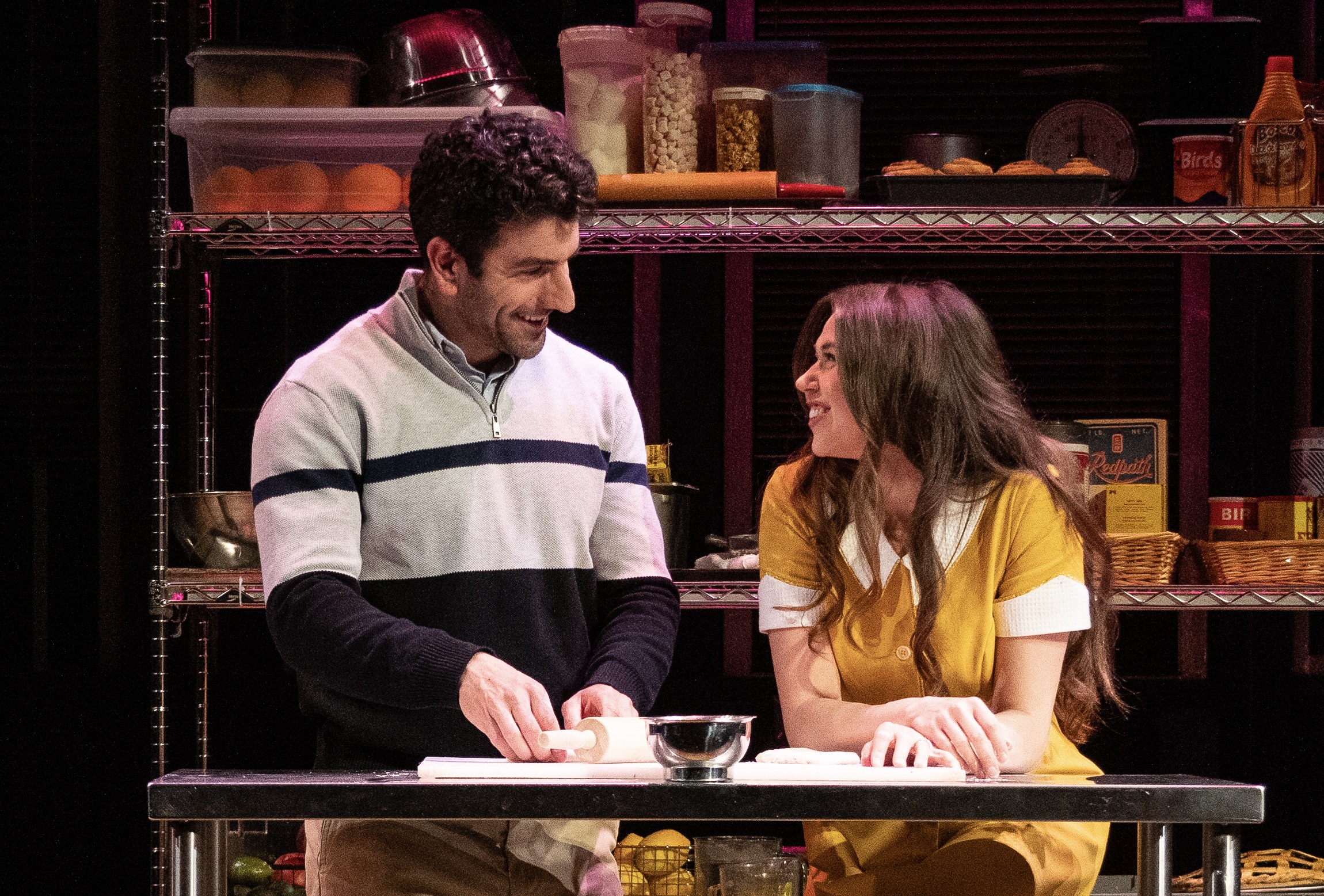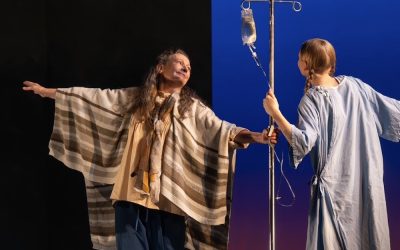The material isn’t immortal, but it’s substantial enough and the production is perfect. Yep, that’s what I said: perfect.
Jessie Nelson’s book for the musical is based on the movie, which was written by Adrienne Shelly. In the story, a waitress and piemaker named Jenna finds out she’s pregnant by her abusive husband Earl, and she’s not happy about it. But Jenna finds hope in the possibility that she might win $20,000 at a piemaking contest, money that could give her a head start in a new life as a single mom. And, when she falls for her handsome (married) new gynecologist, Doctor Pomatter, the possibility that Jenna might not end up single suddenly emerges. (Earl tells her, “Let’s face it, you’re no Sara Lee,” but, in a line I found surprisingly moving, the good doctor says, “If pies were books, yours would be Shakespeare’s letters.”) To the musical’s credit, these narrative pieces do not fall into place exactly as you might expect.
Even better: Waitress is about female self-determination, including sexual emancipation. In the musical’s best song, “She Used to Be Mine”, Jenna sings about the girl she was before she let other people’s expectations take over: “She is messy, but she’s kind/She is lonely most of the time/… She is gone, but she used to be mine.” Jenna and her waitressing pals, Becky and Dawn, all find libidinal liberation. A couple of these relationships are morally compromised, but, without endorsing cruelty, Waitress celebrates the sex — its affirmation, and its affection — because these things are exactly what these women need. Go, Waitress!
But what really impresses me and gives me hope is how seamlessly slick director Ashlie Corcoran’s production is.
Penned by Sara Bareilles, the songs in Waitress require enormous vocal ranges and they’re loaded with tricky intervals. Fortunately, everybody in this production can sing and everybody is a singing actor.
I can’t imagine a better Jenna than the one Rachel Drance delivers. This production hangs on her slim shoulders — she’s got a lot of singing/stage time — and she never disappoints. Just wait till Drance throws her head back and wails her high notes. And Drance inhabits the contours of her self-effacing character with humour, with vulnerability (when Earl raises a hand against her), and with subtlety as she embraces Jenna’s ambivalence.
Drance’s voice has a rich tone and, when that combines in duets with the baritone of Kamyar Pazandeh’s Dr. Pomatter, the results are dreamy. Pazandeh, who is commandingly handsome, fully accesses Pomatter’s nerdy nervousness, which makes for a charming counterpoint.
Playing Ogie, Dawn’s eccentric love interest, Josh Epstein brings the house down with his introductory number, “Never Getting Rid of Me” — or he should bring the house down; my sleepy matinée audience wasn’t up to the task, but, in this number, Epstein delivers one of the most inventive and energetic musical-comedy turns you’re ever going to see.
Ashanti J’Aria and Sarah Cantuba are also sure of voice and sure of characterization as the sassy Becky and awkward Dawn. The beauty of Jacob Woike’s voice makes a compelling case for Earl’s underlying soulfulness. And, late in the proceedings, Tom Pickett, who’s playing Joe, the curmudgeonly owner of the diner/pie shop, hits a home run with his tender delivery of “Take It from and Old Man”: “Take if from an old man/My mistakes have made me/And I am what I am.”
Too much positivity? Too bad. In terms of the production itself, you’re not getting anything else from me in this review.
Waitress moves from scene to scene associatively: there are no hard-edged transitions, even when it goes into memory. Michelle Ramsay’s splashy, evocative lighting design helps enormously with this, and she’s illuminating a handsome and flexible set by Cory Sincennes.
I also want to sing the praises of Shelley Stewart Hunt’s choreography, which fills this space with swirling movement. You know that Busby Berkely convention in which the chorus surrounds the singer with a rotating frame of feather fans? Hunt does that here — with pies.
And this must be said: there is not a weak link among the supporting players. Not a foot, a note, or a gesture is out of place.
I’m sticking by my one caveat: although I heartily endorse Waitress’s pro-sex, pro-moral-complexity stance, this musical is more amiable than profound.
But amiability is not a bad thing. And it’s rare to see a production of such a consistently high standard.
WAITRESS Book by Jessie Nelson. Music and lyrics by Sara Bareilles. Directed by Ashlie Corcoran. An Arts Club production at the Stanley Industrial Alliance Theatre until August 3. (Tickets and information)
PHOTO CREDIT: Kamyar Pazandeh and Rachel Drance in Waitress (Photo by Moonrider Productions)






0 Comments